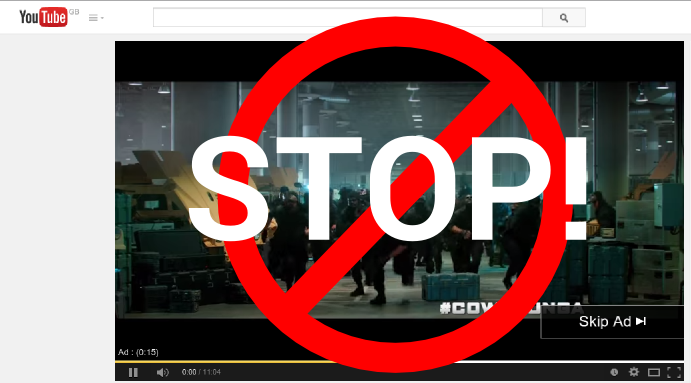
Are ad blockers good for the internet?
Reading various articles on the subject of ad blockers and from personal experience discussing the subject with people from both sides of the camp, I can honestly say this is a controversial question!
However, despite all that, I am going to take an in depth look into the situation and see what details I can pick out from all the arguments, misconceptions and bits and pieces of information that are caught in that thing we call the world wide web.
Firstly an explanation…
What is an ad blocker?
An ad blocker is a program (usually a browser plugin or extension) which actively detects adverts on websites and removes them. If you have an ad blocker installed, you won’t see any ads, unless a site has been added to a ‘white list’.
Why would you use an ad blocker?
Obviously, you use an ad blocker to stop seeing adverts on web pages. What I really meant with the above question is, why would you choose to stop seeing adverts?
Here are some of the reasons you may think about or see mentioned by others online.
Reasons to use an ad blocker
- I don’t like adverts.
- I don’t like intrusive adverts that pop up on my screen.
- I don’t like adverts that auto play video or audio.
- Adverts disrupt the flow of text on a page and make it harder and less enjoyable to read.
- Adverts can contain malicious code.
- Adverts can link to malicious sites or download malware.
- Adverts contain tracking cookies and scripts to watch what I am doing.
The reasons behind an individual’s decision to block adverts or not are likely as many and varied as the individuals themselves. One core concept that runs through all of the examples above is that people want to feel in control. I am the same, as I am sure is everyone else. We don’t like the content we consume to be hijacked by a display ad that covers the entire screen. We don’t like the idea that a third party may be tracking our movements or ‘spying’ on us. We want to take back control of the things we see on our own computers.
“So, ad blockers are great then? Let’s all start using them!”
Wait wait wait. Hold on a minute. We need to think things through a bit first. So let’s look at the reasons and see if an ad blocker is the right way to go about it.
Reasoning out the reasons
1. If you don’t like adverts, good luck. Ad blockers aren’t fool proof and they do contain white lists, so there is no guarantee that a site you visit will not display adverts. However, for the majority of sites, you will be fine.
2. 3. & 4. Intrusive adverts are a pain, it is true. However, consider the sorts of sites that may be displaying them. Aggressive marketing tactics are often associated with (but not always!) poor quality sites or sites that are seen as spammy by the search engines. Are you really sure you want to visit those sites? You could simply stop visiting sites like that. If enough people did that, the marketers behind the adverts would soon catch on that their aggressive tactics do not work and would move on to something more pleasant.
5. 6. & 7. Security concerns are important and valid. However, malicious code can be used anywhere on a website, not just adverts. So ad blockers don’t really offer you any protection. Also if you are worried about tracking cookies and scripts, you can open an incognito session on your browser. This will stop those pesky scripts and cookies from gathering information about you.
So the reasons for ad blocker use aren’t quite as clean cut as we might have first thought. Now it is time to muddy the water even more!
Why should you not use an ad blocker?
Ad blockers do one thing and one thing only, they stop adverts being viewed and being clicked. Advertisers, marketers and web masters talk about PPC (Pay Per Click) and CPM (Cost Per Mille) when referring to money generated by displaying adverts. PPC is self explanatory, meaning if you click on an ad, the person hosting the ad gets paid. CPM is different, in that it is the money a web site will earn per thousand views of an add. No clicks are needed.
Businesses, bloggers and web masters of all stripes complain that ad blockers are depriving them of revenue. The simple truth is, it really does. Proponents of ad blockers will argue that they wouldn’t click on the ad anyway, so it doesn’t make any difference. However, that fails to take into account the effects of CPM.
Before I get bogged down in all the detail, lets look at…
Reasons not to use an ad blocker
- Ad blockers are indiscriminate. Not all adverts are bad. Some in fact are very useful. Some could even be life saving! Public awareness campaigns would certainly fall into this category.
- Behind every website is a real person or group of people. Often their main source of income is through advertising on their website. By removing all adverts, you deny them the money they need to not only keep the website running and producing great content, but also the money they need to stay open as a business, buy food, pay heating bills, etc. This is a bigger problem for the smaller businesses, because they have no backup to take up the slack when times are tough.
- The advertisers suffer as well. Every time an advert is not displayed, a new product goes unannounced or a public health warning is missed (Ebola anyone?). In business terms this means less sales leads for the businesses that are advertising, which means less revenue, which means less money to pay staff, which means… you see where this is going right?
- If free websites can no longer rely on advertising revenue to stay in business, the internet will become less diverse. Sites like Half Term Dates would cease to exist and even large businesses would have to scale back their operations. Google, Microsoft, Yahoo, eBay and many other big brand names all rely on advertising to one degree or another.
- Removing adverts also removes important visual queues about the quality of a site. If you see a site and like the content, or share it because you think someone else may like it, you could be sharing something that really does have infected ads, or something else inappropriate.
“So ad blockers are bad? Right, I won’t touch them”
Wait wait wait! We still need to do some thinking here.
Reasoning out the reasons
1. Okay, so some stuff that is useful and/or important would be missed. There is always TV, radio and the newspaper for that stuff. Isn’t there? Well, the same people that argue they don’t like adverts, are likely the ones that switch channels on the TV during the commercial break, ‘tune out’ when they hear a jingle on the radio and just skip pages and pages of ads in newspapers. I am not saying this is true in every case, but you have to admit that whenever you remove a method of communication from the mix, the chances are greater that something important is missed.
2. Some websites use alternative forms of funding. They may have sponsorship deals for instance. This is fine for some types of site, but not all. As a business owner myself, I would be wary about relying too heavily on any one sponsor. It would be easy for a sponsor to pull out of a deal and cause serious problems for the business owner. Also you have to look at things objectively. If a site is sponsored, can you guarantee the views and opinions expressed are unbiased? The reality is, to remain impartial a lot of websites have to use an ad network of one form or another.
3. Other forms of advertising do exist for businesses that want to use them. However, in terms of reach the internet is much more cost effective for the average business. Additionally if your business allows for payments online, or performs an online service of some type, it makes sense to advertise on the web. How many times have you seen a website address in a newspaper and typed it in manually into your browser? Hardly ever I reckon.
4. To maintain a website requires money. Plain and simple. To maintain a website and still have enough money for life’s essentials requires even more money. Stripping away a source of income which enables a website to remain impartial, will either spell the end of that website or it will mean the loss of impartiality. The end user experience will likely suffer.
5. Humans are visual creatures. Enormous amounts of time are spent making websites look just right. In fact, anything you can name that has ever been made has had some level of design applied to make it more visually appealing. We pick up things so quickly from images and the visual queues they give us. We make judgements based on first impressions, before we have even heard someone speak. If you remove the adverts from a site, especially a site that has overly aggressive and/or spammy advertising, then you miss all of these important visual queues. If you share that site with someone, because you simply didn’t know what it was really like, at best you may annoy that person and at worst they may download a virus and blame you.
Muddying the waters even further
Ad blocking software is itself funded by advertising. The Guardian published an article two days ago, which explains the business model employed by the ad blocking industry.
It goes something like this. “We’ll block ads on your site without asking. We will unblock them if you follow these guidelines and if you are a big company (with lots of money) we will charge you for the privilege of being added to our white list.”
In any other area of business there is a word for that, and that word has been used openly many times by publishers. Extortion.
Now, ad blocking software wouldn’t have been invented if there wasn’t a perceived need for it. Many websites do use aggressive marketing tactics and it does ruin the experience for the average web user who just wants to read something, or watch a video, etc. However, ad blocking software is indiscriminate. It doesn’t differentiate between ‘good’ sites and ‘bad’ sites. It has been described as “using a sledge hammer to crack a peanut.”
So what should we do about it? Is it time for the ad blocking industry to re-invent itself? Perhaps leave websites alone by default and allow the user to control which sites get blocked from the word go? That would certainly put control back in the hands of you and I. What about regulation? If the ad blockers are there because of unethical marketing tactics and annoying practices, would regulation remove the need? What about regulating the ad blockers themselves? Finally, what about finding alternative business models that do not rely on advertising at all? Is that even possible?
The final choice anyone can make with regards to using ad blocking software or not, is going to be a personal one. I am afraid rather than giving you a clear answer above, I have probably just given you more questions instead.
The time for discussion and reflection is now.
